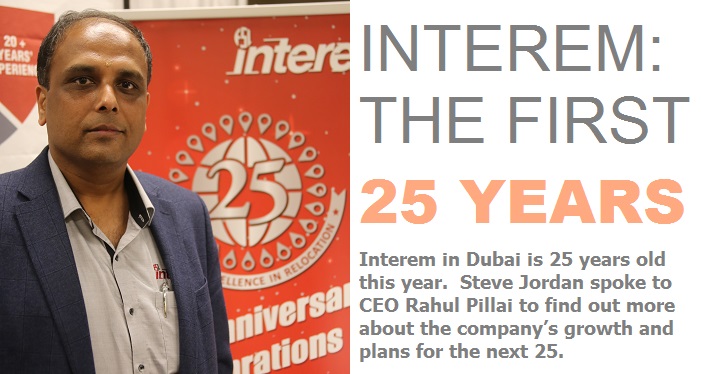Interem in Dubai is 25 years old this year. Steve Jordan spoke to CEO Rahul Pillai to find out more about the company’s growth and plans for the next 25.

Interem started operations in Dubai, UAE. Since then the company has developed massively and is now a major force in the UAE, Kuwait, Qatar and, most importantly perhaps, in India, home to its biggest market. It is well known by partners around the globe and is always well represented at industry events. The company is now a member of the Harmony network.
Although traditional corporate household moving represents most of Interem business, today the company has diversified for a number of reasons. The main reasons being to smooth out the business workload (as household removals is very seasonal) and also, the trend towards more business being controlled by third parties, such as Relocation Management Companies. Although Interem is happy to work with the RMCs it understands that it is also important to have as much control as possible over its own business opportunities.
For this reason, Interem has expanded its services recently to provide more commercial moving services. Commercial moving now represents about 25% of Interem’s turnover, with the profitability about the same as household goods, but with a faster payment schedule. The life cycle of an office move is much quicker than household goods and it is not seasonal. Multiple business revenue models mean Interem gets a chance to keep the order books filled all year round.
Besides the business moves, Interem also performs high-level laboratory moves and relocations for IT companies. Interem recently relocated the world’s largest biometric data centre, based in Delhi and Bangalore with total assets worth around $500m. As Rahul explained, “This type of work has really brought a change in the last two years in the way we do business. It’s reduced our dependency on the seasonality of household goods moving, and on cheap business. We don’t want to participate in a business that we don’t consider to be viable.”
The commercial business also has a knock-on effect for the household goods work as it gives Interem visibility within an account. For example, by doing a business move for Amazon there are a lot of people who see Interem every day and there’s a very high chance of securing private lump sum business because they see the brand all the time. And this is a market segment that’s growing.
Interem’s biggest market is India where the company employs around 400 people and has seen double-digit growth in recent years. Rahul said that the key reasons for the exponential growth of Interem Group in its markets has been people - the core team, who stood by the company during the most challenging phases. He also said that the backbone and key differentiator is the packing teams working behind the scenes who offer the services, always with a smile on their faces.
Of course, the whole industry is changing and it’s no different for Interem. Shipments are smaller, people are less interested in possessions, they are more global citizens who don’t feel the need for hand holding, and they want services delivered through their smartphones. There are still some, generally older people however, who still want a full moving service. Interem realises that it’s essential to provide the services demanded by both social groups, retaining the capacity for personal service but embracing the need for greater automation.
For example, video surveys have become commonplace, but less so in India where labour is plentiful so it’s easier and cheaper to send a surveyor round in person. This will change over time as people demand more app-based services to do surveys, get quotations, track shipments and pay for them. That’s the future and Interem believes it is prepared for it, while also respecting the traditional market and serving its needs.
As Rahul said, “Interem is in the growth trajectory. We are in the process of identifying newer leaders and grooming them to take on bigger responsibilities to expand the business and brand We want our business to continue to grow but have no intention of expanding outside our main markets. Instead the vision for the future is to become the most recognised moving company in the markets in which it operates. We want to be noticed by our customers, potential customers, partners and suppliers as the most recognised brand and to have the opportunity of working with these companies. That’s our objective to 2025 and it’s my job to make sure we get there.”
With such a clear vision, Interem is set for the next 25 years, drawing on its experience and its willingness to change with customer and market requirements. Although business will be different, Rahul is confident of one fundamental that cannot be denied: “Technology might affect everything we do, but it will never carry furniture into a house,” he said. “As long as we can do that, and have the means to attract sufficient business, our future is secure.”
Photo: Rahul Pillai